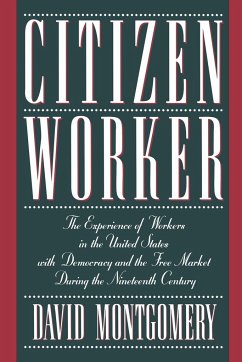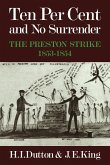David Montgomery
Citizen Worker
The Experience of Workers in the United States with Democracy and the Free Market During the Nineteenth Century
23,99 €
inkl. MwSt.
Versandfertig in 1-2 Wochen

12 °P sammeln
David Montgomery
Citizen Worker
The Experience of Workers in the United States with Democracy and the Free Market During the Nineteenth Century
- Broschiertes Buch
- Merkliste
- Auf die Merkliste
- Bewerten Bewerten
- Teilen
- Produkt teilen
- Produkterinnerung
- Produkterinnerung
Discusses the relationship between workers and the government by focusing not on the legal regulation of unions and strikes, but on popular struggles for citizenship rights.
Andere Kunden interessierten sich auch für
![Birds of Passage Birds of Passage]() Michael PioreBirds of Passage51,99 €
Michael PioreBirds of Passage51,99 €![Shop Floor Bargaining and the State Shop Floor Bargaining and the State]() Shop Floor Bargaining and the State28,99 €
Shop Floor Bargaining and the State28,99 €![The Making of the Chinese Industrial Workplace The Making of the Chinese Industrial Workplace]() Mark W. FrazierThe Making of the Chinese Industrial Workplace35,99 €
Mark W. FrazierThe Making of the Chinese Industrial Workplace35,99 €![Segmented Work, Divided Workers Segmented Work, Divided Workers]() David M. GordonSegmented Work, Divided Workers29,99 €
David M. GordonSegmented Work, Divided Workers29,99 €![The Economics of Earnings The Economics of Earnings]() Solomon W. PolachekThe Economics of Earnings47,99 €
Solomon W. PolachekThe Economics of Earnings47,99 €![Labour Women Labour Women]() Pamela M. GravesLabour Women36,99 €
Pamela M. GravesLabour Women36,99 €![Ten Per Cent and No Surrender Ten Per Cent and No Surrender]() H. I. DuttonTen Per Cent and No Surrender40,99 €
H. I. DuttonTen Per Cent and No Surrender40,99 €-
-
-
Discusses the relationship between workers and the government by focusing not on the legal regulation of unions and strikes, but on popular struggles for citizenship rights.
Hinweis: Dieser Artikel kann nur an eine deutsche Lieferadresse ausgeliefert werden.
Hinweis: Dieser Artikel kann nur an eine deutsche Lieferadresse ausgeliefert werden.
Produktdetails
- Produktdetails
- Verlag: Cambridge University Press
- Seitenzahl: 204
- Erscheinungstermin: 18. März 2002
- Englisch
- Abmessung: 229mm x 152mm x 12mm
- Gewicht: 339g
- ISBN-13: 9780521483803
- ISBN-10: 0521483808
- Artikelnr.: 21192729
- Herstellerkennzeichnung
- Libri GmbH
- Europaallee 1
- 36244 Bad Hersfeld
- gpsr@libri.de
- Verlag: Cambridge University Press
- Seitenzahl: 204
- Erscheinungstermin: 18. März 2002
- Englisch
- Abmessung: 229mm x 152mm x 12mm
- Gewicht: 339g
- ISBN-13: 9780521483803
- ISBN-10: 0521483808
- Artikelnr.: 21192729
- Herstellerkennzeichnung
- Libri GmbH
- Europaallee 1
- 36244 Bad Hersfeld
- gpsr@libri.de
David Montgomery is an American conductor, pianist, and musicologist. He studied in Paris with René Leibowitz and in the U.S. and Vienna with Paul Badura-Skoda. He became Leibowitz's assistant in France, specializing in music of the Second Viennese school. Later, he studied the interpretation of contemporary music with Pierre Boulez in Los Angeles. After completing a PhD in musicology at UCLA, he taught for several years at UC Santa Barbara. In 1990 Montgomery joined the summer faculty of the Waterloo Festival at Princeton University as a chamber music coach and Director of the Baroque Ensemble. He worked in New York for Sony Tri-Star/Columbia Pictures as a conductor, and then in Europe for the editorial and production divisions of Sony Music Inc and Sony Classical GmbH. From Hamburg, Montgomery toured Europe as a pianist and helped to revitalize the Jena Philharmonic in the former East Germany as the orchestra's principal guest conductor. With the Philharmonic he made recordings for BMG's Arte Nova label in Munich. David Montgomery's first book, Franz Schubert's Music in Performance (Pendragon, 2003/paperback 2010) has become widely known in performance and scholarly circles. He is an authority on Austro-German music of the past several centuries, and his essays for the international recording industry have been translated into numerous languages and distributed throughout the world. Montgomery has lectured at Georgetown University, the College of William and Mary, University of Chicago, Harvard University, the Universities of Halle and Göttingen, and at the major campuses of the University of California.
Acknowledgements
Introduction
Part I. Wage-Labor, Bondage and Citizenship: 1. The Right to Quit
2. Free Labor in the Shadow of Slavery
3. Quitting and Getting Paid
4. Citizenship and the Terms of Employment
Part II. Policing People for the Free Market: 5. The Definition and Prosecution of Crime
6. The Privatization of Poor Relief
7. The Crime of Idleness
8. Arms and the Man
9. Police Powers and Workers' Homes
Part III. Political Parties: 10. Black Workers and Republicans in the South
11. Industrial Workers and Party Politics
12. Workers and Tammany Hall
13. Labor Reform and Electoral Politics
14. Citizenship and the Unseen Hand
Bibliography.
Introduction
Part I. Wage-Labor, Bondage and Citizenship: 1. The Right to Quit
2. Free Labor in the Shadow of Slavery
3. Quitting and Getting Paid
4. Citizenship and the Terms of Employment
Part II. Policing People for the Free Market: 5. The Definition and Prosecution of Crime
6. The Privatization of Poor Relief
7. The Crime of Idleness
8. Arms and the Man
9. Police Powers and Workers' Homes
Part III. Political Parties: 10. Black Workers and Republicans in the South
11. Industrial Workers and Party Politics
12. Workers and Tammany Hall
13. Labor Reform and Electoral Politics
14. Citizenship and the Unseen Hand
Bibliography.
Acknowledgements
Introduction
Part I. Wage-Labor, Bondage and Citizenship: 1. The Right to Quit
2. Free Labor in the Shadow of Slavery
3. Quitting and Getting Paid
4. Citizenship and the Terms of Employment
Part II. Policing People for the Free Market: 5. The Definition and Prosecution of Crime
6. The Privatization of Poor Relief
7. The Crime of Idleness
8. Arms and the Man
9. Police Powers and Workers' Homes
Part III. Political Parties: 10. Black Workers and Republicans in the South
11. Industrial Workers and Party Politics
12. Workers and Tammany Hall
13. Labor Reform and Electoral Politics
14. Citizenship and the Unseen Hand
Bibliography.
Introduction
Part I. Wage-Labor, Bondage and Citizenship: 1. The Right to Quit
2. Free Labor in the Shadow of Slavery
3. Quitting and Getting Paid
4. Citizenship and the Terms of Employment
Part II. Policing People for the Free Market: 5. The Definition and Prosecution of Crime
6. The Privatization of Poor Relief
7. The Crime of Idleness
8. Arms and the Man
9. Police Powers and Workers' Homes
Part III. Political Parties: 10. Black Workers and Republicans in the South
11. Industrial Workers and Party Politics
12. Workers and Tammany Hall
13. Labor Reform and Electoral Politics
14. Citizenship and the Unseen Hand
Bibliography.







